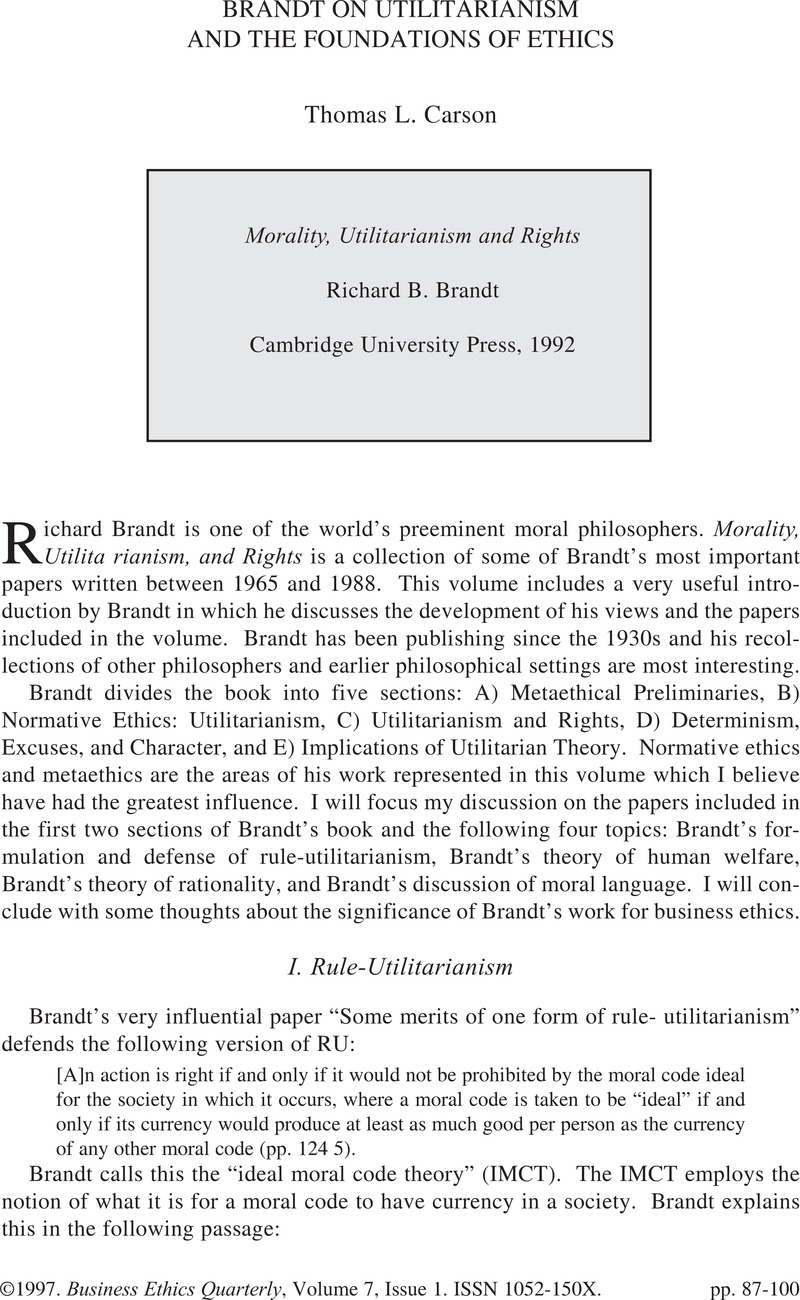Published online by Cambridge University Press: 23 January 2015

* I am indebted to Brad Hooker for helpful criticisms of an earlier draft of section I. I would also like to thank Chris Meyers and Mark Schneider.
1 Unless otherwise indicated, all page numbers refer to Morality, Utilitarianism. and Rights.
2 Oxford: Oxford University Press, 1967.
3 See W.D. Ross The Right and the Good, (Oxford: Oxford University Press, 1930) and The Foundations of Ethics, (Oxford: Oxford University Press, 1939). To say that a certain action is one’s prima facie duty (in Ross’s sense) is to say that there is a presumption for thinking that it is one’s actual duty (what one ought to do all things considered). A prima facie duty is one’s actual duty in the absence of countervailing reasons for thinking that it is not one’s duty (on Ross’s view, the only countervailing reasons are conflicting prima facie duties). Consider a brief example. There is a prima facie duty not to lie. It is my actual duty not to lie provided that the duty not to lie is more important than any prima facie duty (or duties) that conflict with it (in this case).
4 In this paper Brandt states his theory as follows:
An act is morally right if it would be permitted by the moral code optimal for the society of the agent (p. 147).
5 An Outline of a Utilitarian Theory of Ethics, in Utilitarianism For and Against, with Bernard Williams, (Cambridge: Cambridge University Press, 1972), p. 10.
6 The Right and the Good, p. 21.
7 For more on the issue of the demandingness of RU see the following papers: Brad Hooker, “Rule Consequentialism,” Mind, 99, 1990, pp. 67-77; Thomas Carson, “A Note on Hooker’s ‘Rule-Consequentialism,’” Mind, 100, 1991, pp. 117-121; and Brad Hooker, “Rule Consequentialism and Demandingness: A Reply to Carson,” Mind, 100, 1991, pp. 269-276. Hooker argues that RU is substantially less demanding than AU.
8 I have in mind Mill’s harm principle (which says that the only reason for which the state can be justified in limiting a person’s freedom is to prevent harm to others) and theories of corporate social responsibility according to which a corporation’s pursuit of profits is constrained by the duty not to harm others. See Kenneth Goodpaster “Business Ethics and Stakeholder Analysis,” in Business Ethics Quarterly, Vol. 1 number 1, pp. 53-72 and John Simon, Charles Powers, and Jon Gunneman, “The Responsibilities of Corporations and Their Owners,” in Ethical Theory and Business, Tom Beauchamp and Norman Bowie, eds., fourth edition, (Englewood: Prentice Hall, 1994), pp. 60-65.
9 This greatly oversimplifies the argument. For needed qualifications see “Self-Interest and the Concept of Self-Sacrifice,” Canadian Journal of Philosophy 10, 1980. Overvold refines the argument to make the even stronger objection that Brandt’s view makes it logically impossible for there to be any genuine acts of self-sacrifice. See Brad Hooker, “A Breakthrough in the Desire Theory of Welfare,” Richard Brandt, “Overvold on Self-Interest and Self-Sacrifice,” and Thomas Carson, “The Desire-Satisfaction Theory of Welfare: Overvold’s Critique and Reformulation,” all included in Rationality, Morality, and Self-Interest: Essays Honoring Mark Carl Overvold, John Heil, editor (Lanhan: Rowman Littlefield, 1993).
10 ”Morality, Self-Interest and Reasons for Being Moral,” Philosophy and Phenomenological Research, 44, 1984, p. 499.
11 ”Two Concepts of Utility,” in The Limits of Utilitarianism, Miller and Williams eds. (Minneapolis University of Minnesota Press, 1982); see p. 173 in particular. Also see Brandt’s paper “Overvold on Self-Interest and Self-Sacrifice,” in Rationality. Morality, and Self-Interest: Essays Honoring Mark Carl Overvold, John Heil, editor.
12 Indeed, I haven’t listed all of those that Brandt himself enumerates.
13 See my paper “The Desire-Satisfaction Theory of Welfare: Overvold’s Critique and Reformulation,” in Rationality, Morality, and Self-Interest: Essays Honoring Mark Carl Overvold, John Heil, editor.
14 R. M. Hare, Moral Thinking, (Oxford: Oxford University Press, 1981), pp. 105-106.
15 Social Theory and Practice, 15, 1989, pp. 33-58.
16 Oxford: Oxford University Press, 1979.
17 I develop this in greater detail in The Status of Morality (Dordrecht: Reidel, 1984), pp. 66-67 and 178-179. 19
18 Cf. Sidgwick, The Methods of Ethics, seventh edition, (New York: Dover, 1966):
Since it is implied in the very notion of Truth that it is essentially the same for all minds, the denial by another of a proposition that I have affirmed has a tendency to impair my confidence in its validity. ... the absence of such disagreement must remain an indispensable negative condition of the certainty of our beliefs. For if I find any of my judgments, intuitive or inferential, in direct conflict with a judgment of some other mind, there must be error somewhere: and I have no more reason to suspect error in the other mind than in my own (pp. 341-342).
19 See, The Right and the Good, pp. 27-29.
20 For an example of an analysis of a normative concept that explicitly rejects the appeal to ordinary usage and conventional meaning, see my paper “Conflicts of Interest,” Journal of Business Ethics, 13, 1994, pp. 387-404.
21 For a bibliography of Brandt’s writings up until 1976 see Values and Morals, A. I. Goldman and J. Kim, eds. (Dordrecht: Reidel, 1978).